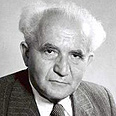
In the country's nascent years, first Prime Minister David Ben-Gurion shaped its patterns of governance.
One crucial aspect was the need to respect and accept the authority of state institutions, such as the army and Knesset. He viewed this as a major tool for the prevention of anarchy, particularly in an ideological society such as our own at the time.
In order to apply this principle, which was sacred in his view, he did not hesitate to adopt an iron fist and even resort to physical clashes. An example of this is the Altalena affair. In the summer of 1948, the Irgun organization dispatched a ship carrying arms from Europe to Israel and demanded that some of those weapons be transferred to its units in Jerusalem, which at the time was not a part of the State of Israel.
The provisional government and its leader objected to this demand, yet despite this Irgun attempted to unload the ship on the Tel Aviv shore. Ben-Gurion's response was decisive. He ordered the army to bombard the ship and the result was tragic: Dozens of people were killed.
Irgun veterans viewed Ben-Gurion as a murderer of Jews and a figure that is capable of spilling Jewish blood. Ben-Gurion himself viewed this in a completely different light. He saw the severe step he adopted as required for reinforcing the young country's sovereignty. In his view, the domestic enemy was just as dangerous as external ones. He referred to the cannon that bombarded the ship as "the sacred cannon."
Poet Natan Alterman even wrote about the incident, saying that the cannon served an important purpose and constituted a victory for the urge of a nation over the urge of a herd.
More dangerous than Altalena
Today, ahead of the upcoming 60th Independence Day, this phenomenon is back on a grand scale. Its buds appeared many years ago, when the first Yitzhak Rabin government gave in to the pressure exerted by the "Gush Emunim" settlement movement and approved the establishment of a community at the heart of the West Bank. Since then, this approach worked vis-à-vis all governments, which to a large extent turned into puppet governments acting in accordance with the Yesha Council's caprices.
Following the disengagement, this approach turned into a sophisticated system – mass insubordination with the approval of eminent rabbis and senior politicians, in order to torpedo the moves adopted by the elected government.
What we are seeing at this time dwarfs the Altalena affair, which was a single incident that took place in the country's nascent years and became a tragic story by coincidence. Yet this time around we are talking about acts that are undertaken in a calculated and conscious manner in order to show the world who the real master is in the West Bank in general, and in the city of our forefathers, Hebron, in particular – the Israeli sovereign or the people of the fist from Beit Hadassah.
The damage they are causing is immense, and it is hard to exaggerate its scope. They undermine the authority of the fragile Israeli government and the prestige of its institutions every day and every hour. Thus, they join the overall phenomenon taking place at this time: Stoning, with catapults, our democratic structure. In practice, they form an unconscious alliance with the great destroyer of our country's institutions - the distinguished professor from Tel Aviv appointed as justice minister by the prime minister.
In 1952, after a violent protest organized by the Herut movement in Jerusalem against the reparations from Germany, Ben-Gurion asked some incisive questions: "Are we a democracy or not? Will the law and elected officials rule, or will terror and the fist?"
This question, which was asked 55 years ago, can be asked again today regarding the conduct of the insubordinate IDF soldiers, their rabbis, and their supporters at the legislature.
The writer heads the Land of Israel Studies department at the University of Haifa















